Welcome to join us at Ukraine Discovery Day – Tuesday 27 February, 09:30 – 16:30
Where: Malmö University, Orkanen, room OR:C231, Nordenskiöldsgatan 10
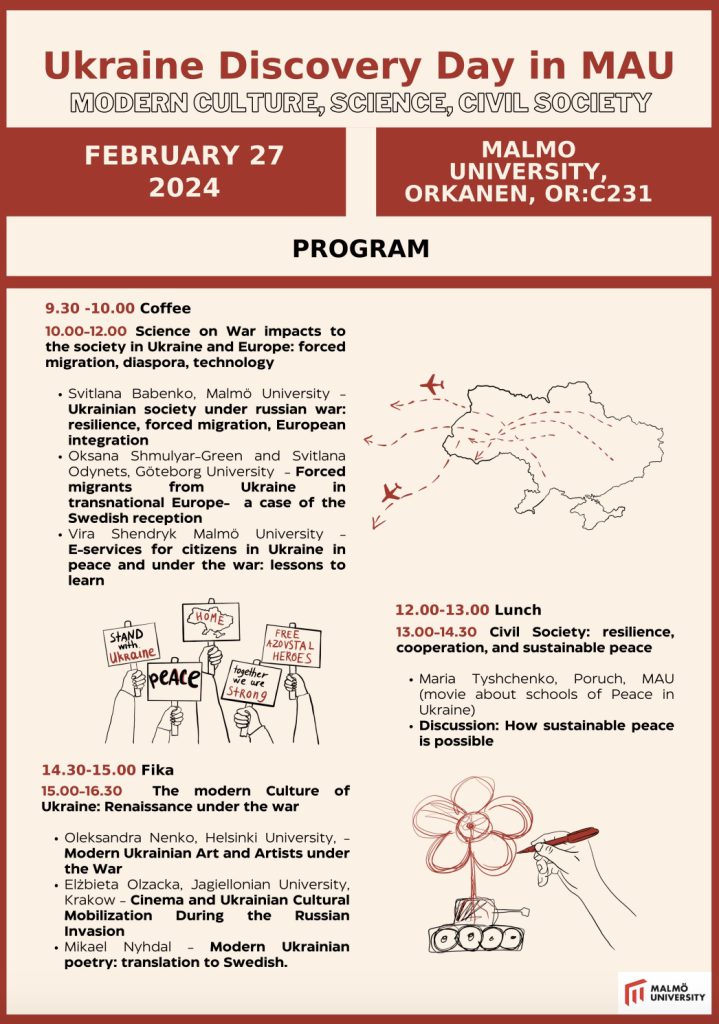
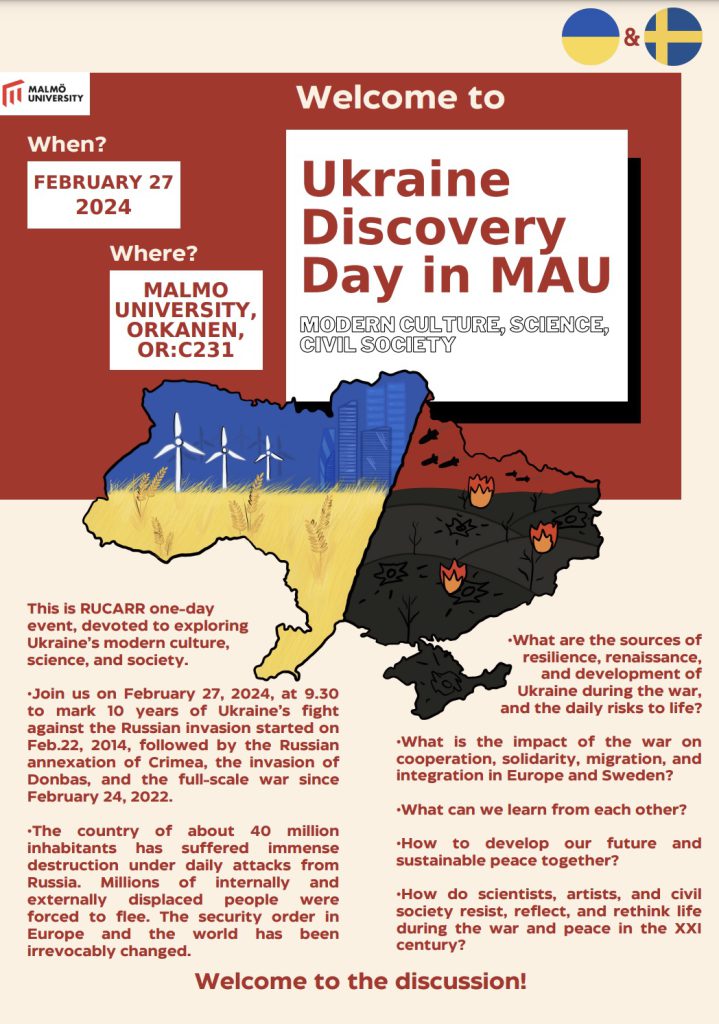
Welcome to join us at Ukraine Discovery Day – Tuesday 27 February, 09:30 – 16:30
Where: Malmö University, Orkanen, room OR:C231, Nordenskiöldsgatan 10


Lara Sanchez Gil received the RUCARR Thesis Award 2023 for her MA thesis Being together through ICTs
Transnational family practices in the context of Ukrainian forced migration. It was written as an MA thesis in the subject International Migration and Ethnic Relations, at the Department of Global Political Studies, Malmö University. Supervisor: Katarina Mozetič. The prize was awarded by Dean of the Faculty of Culture and Society, Annika Olsson, Our warm congratulations to Lara!
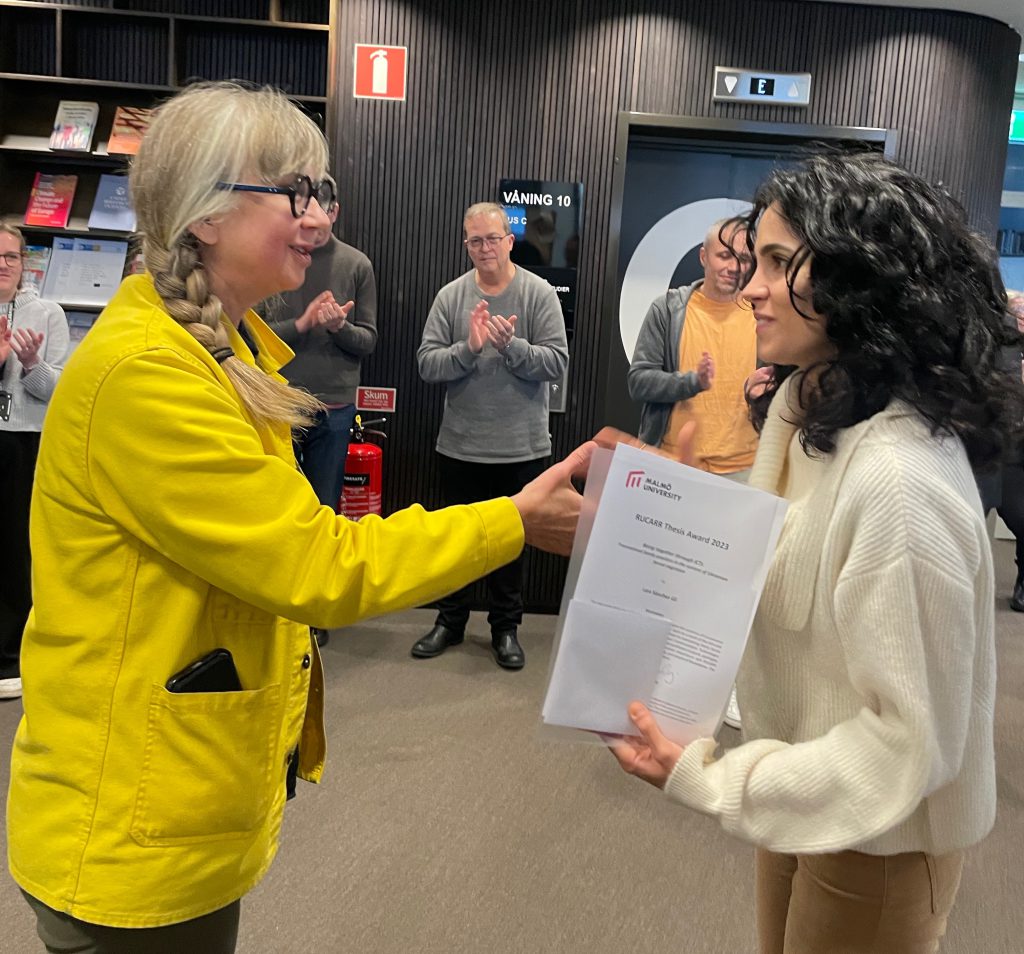
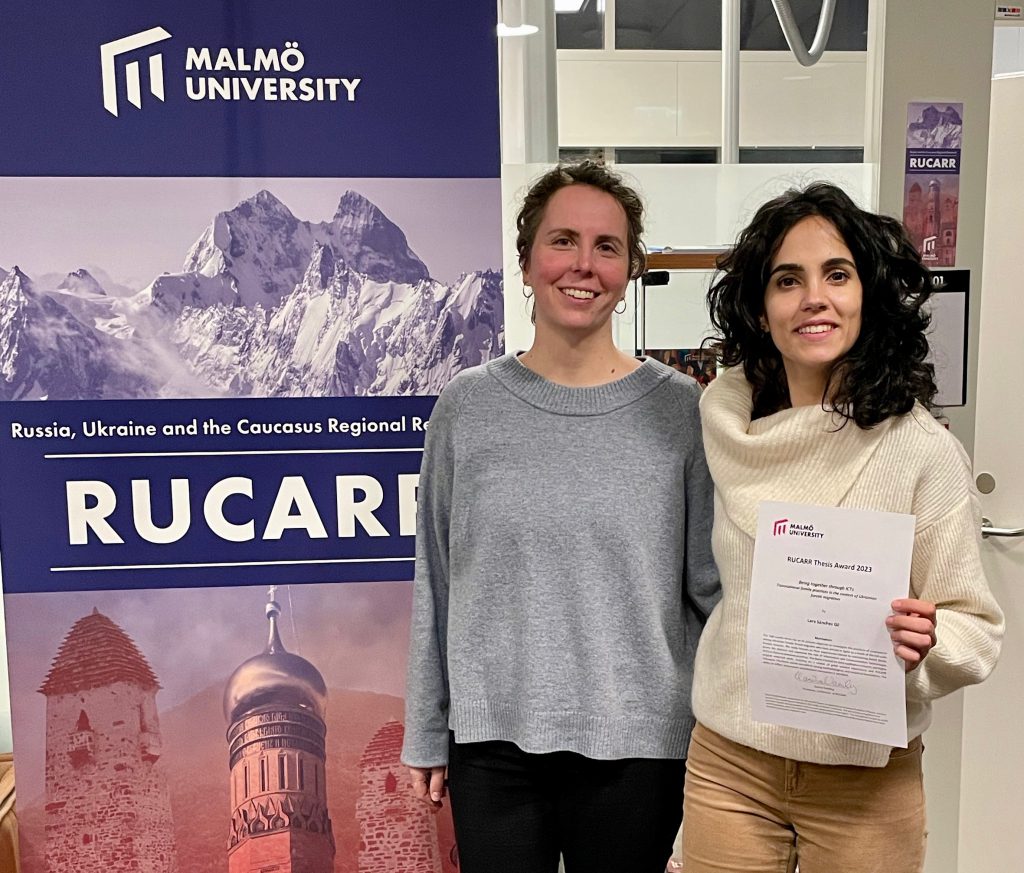
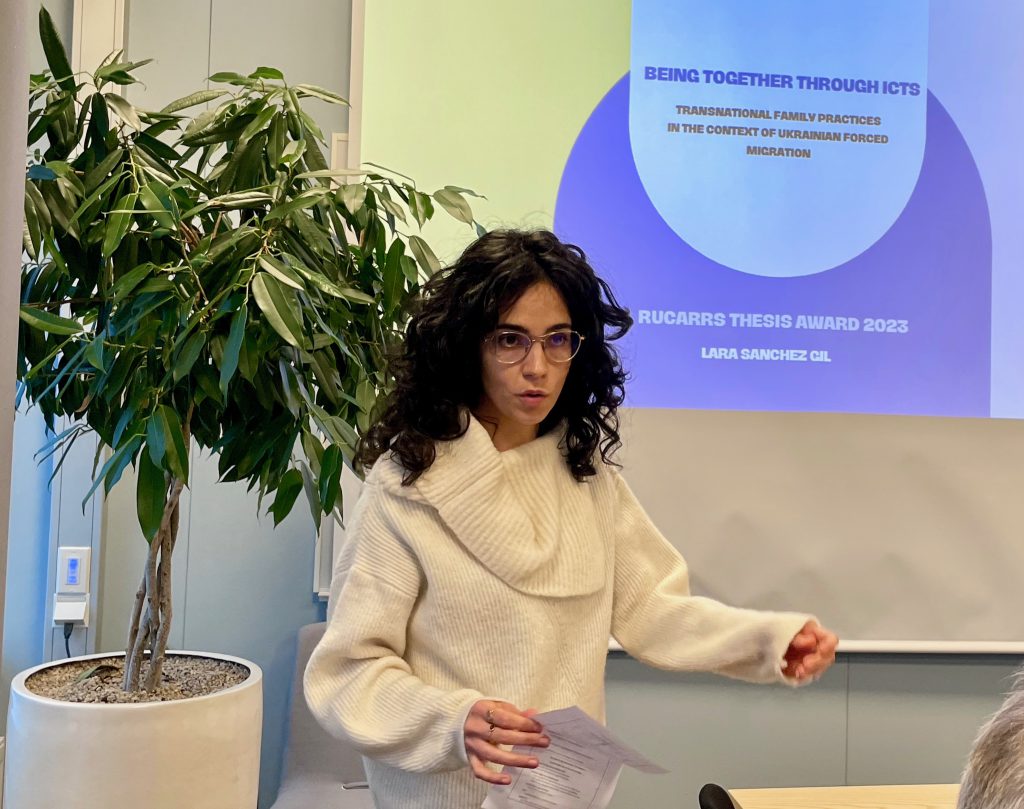
An Honorauble mention was awarded to Johan Richter for his BA Thesis The Russia and China Disinformation Nexus (below). Supervisor: Isobel Squire.
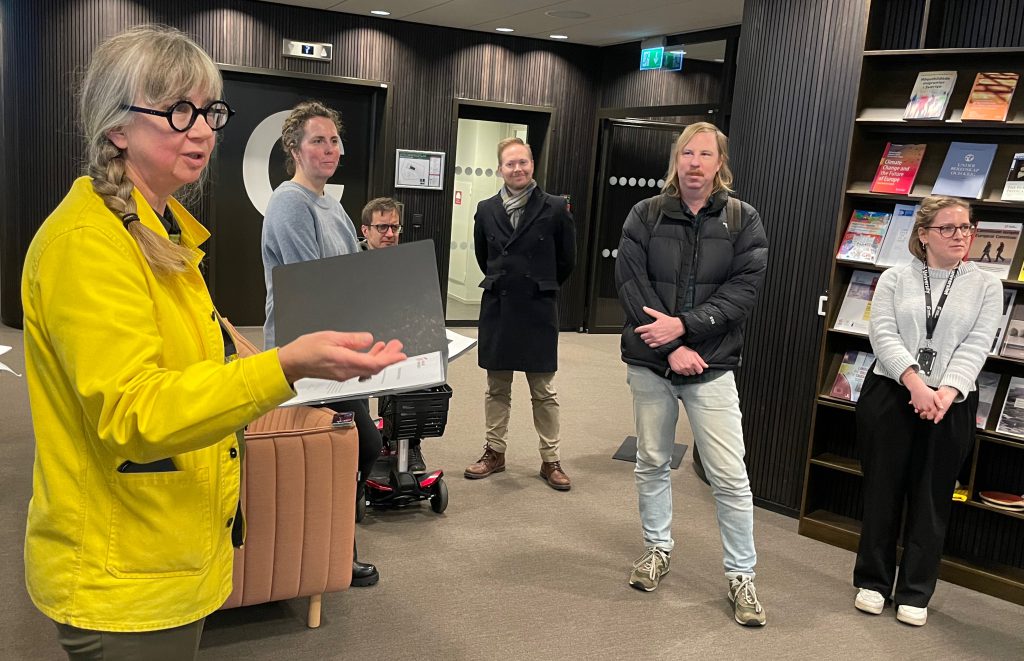
The RUCARR thesis competition for BA and Masters levels at Malmö University is organized by the research platform Russia, Ukraine and the Caucasus Regional Research (RUCARR). The aim of this competition is to promote interest among students in the current development in the region.
When: December 13, 15.15
Where: Niagra building, 9th floor, room 1029
Zoom: https://mau-se.zoom.us/j/67665494034
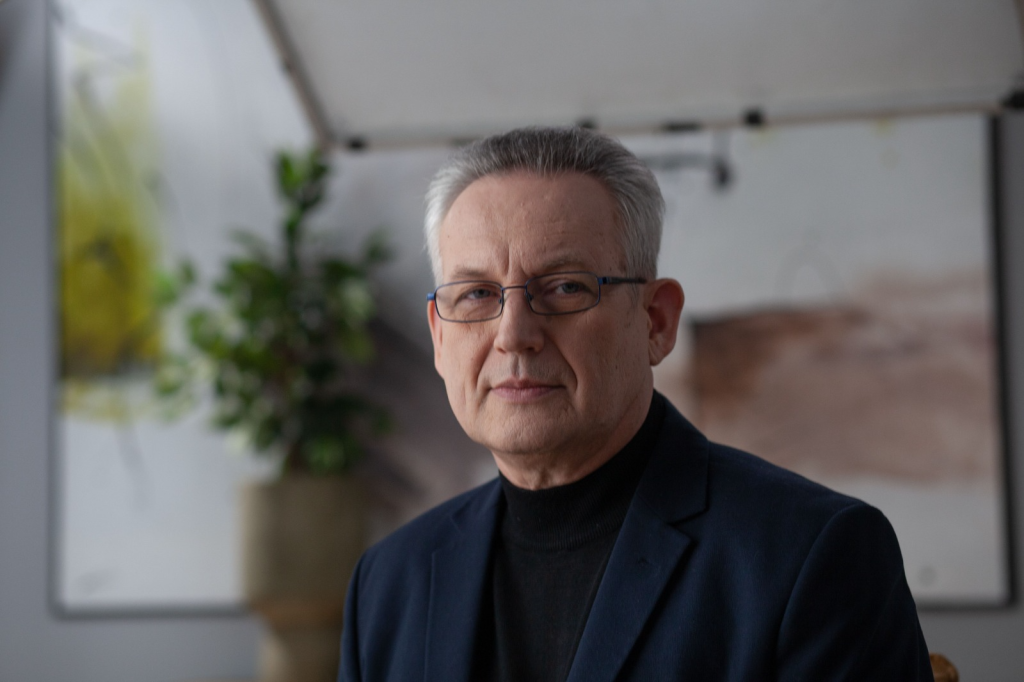 Prof. Oleg Mazuryk will be speaking on the topic of ‘Civic Engagement in the Context of the Russian War in Ukraine: Practice and Research,’ focused of his ongoing research on the phenomenon of self-organization and social cohesion within Ukrainian society. His study is done in cooperation with the Ukrainian Evaluation Association. From the full-scale invasion in Feb 2024, there was an epicenter of social activities and hostilities in the Kyiv region, near the now globally renowned town of Bucha. The intention behind this initiative is to document the first-hand experience of Ukrainian resistance to Russian aggression, aiming at making this valuable information accessible for academic and professional scrutiny. The findings of the research into the self-organization and unification of Ukrainians are derived from a comprehensive analysis of 142 in-depth interviews. It is important to note that this is a work in progress, with further insights and data yet to be gathered and analyzed. This presentation will delve into the role that civic engagement played at the onset of the full-scale invasion and how it can contribute to the further development of a sustainable and democratic society in the post-war period.
Prof. Oleg Mazuryk will be speaking on the topic of ‘Civic Engagement in the Context of the Russian War in Ukraine: Practice and Research,’ focused of his ongoing research on the phenomenon of self-organization and social cohesion within Ukrainian society. His study is done in cooperation with the Ukrainian Evaluation Association. From the full-scale invasion in Feb 2024, there was an epicenter of social activities and hostilities in the Kyiv region, near the now globally renowned town of Bucha. The intention behind this initiative is to document the first-hand experience of Ukrainian resistance to Russian aggression, aiming at making this valuable information accessible for academic and professional scrutiny. The findings of the research into the self-organization and unification of Ukrainians are derived from a comprehensive analysis of 142 in-depth interviews. It is important to note that this is a work in progress, with further insights and data yet to be gathered and analyzed. This presentation will delve into the role that civic engagement played at the onset of the full-scale invasion and how it can contribute to the further development of a sustainable and democratic society in the post-war period.
Prof. Oleg Mazuryk is the Head of Social Structures and Social Relations Department at the Faculty of Sociology at Taras Shevchenko National University of Kyiv, Ukraine. His research interests encompass social audit, social control, social responsibility, monitoring, and evaluation of social programs and projects. He serves as the head of the NGO Social Audit Centre and the chairman of the Ukrainian Evaluation Association. His primary efforts are directed toward the training of young evaluators, the promotion of an evaluation culture, and the development of professional and civic competencies.
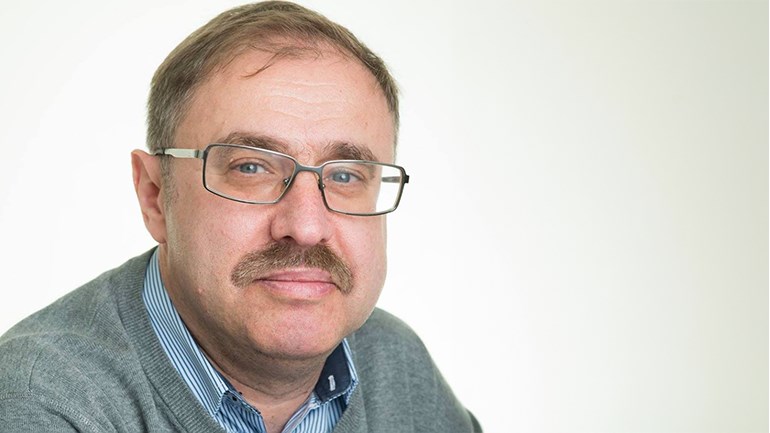 You are welcome to attend a lecture by Vladimir Gelman, professor at Aleksanteriinstitutet, University of Helsiniki, and new member of RUCARR’s Advisory Board. He will talk about ‘Why Russia Fails: Origins of the Ukrainian Catastrophe’, which also is the subjet of his coming book. The event is a collaboration with Global Europe & International Cooperation (GEIC).
You are welcome to attend a lecture by Vladimir Gelman, professor at Aleksanteriinstitutet, University of Helsiniki, and new member of RUCARR’s Advisory Board. He will talk about ‘Why Russia Fails: Origins of the Ukrainian Catastrophe’, which also is the subjet of his coming book. The event is a collaboration with Global Europe & International Cooperation (GEIC).
Vladimir Gelman’s areas of expertise include Russian and post-Soviet politics and governance. This knowledge is applied in a theoretical and comparative perspective with a special emphasis on political regime dynamics, political institutions, policy-making, electoral and party politics, regional, and local government.
His most recent book isThe Politics of Bad Governance in Contemporary Russia (University of Michigan Press, 2022). Previous works include Authoritarian Russia: Analyzing Post-Soviet Regime Changes (University of Pittsburgh Press, 2015) and Authoritarian Modernization in Russia: Ideas, Institutions, and Policies (Routledge, 2017). He also authored scholarly articles in Post-Soviet Affairs, International Political Science Review, East European Politics, and other journals.
When: November 28, 15-17
Where: Niagara, K3 Studio 5th floor, C0541
A warm thank you to all contributors at the Symposium – presenters at campus and in online panels. And thank you for all good and inspiring discussions! Symposium program and abstracts
Registration required for zoom and webinar links. [check for program updates]
10.00 Opening of the Symposium
— Dr. Liudmyla Pidkuimukha (Justus Liebig University Giessen) Weaponizing Language: How Russia Commits Linguicide on the Occupied Territories of Ukraine
—Svetlana L’nyavsky (Lund University): I am a Russian Ukrainian, but I will not learn Ukrainian just for you! Language ideological debates, linguistic vigilantism, and Internally Displaced People at the time of war
— Solomija Buk, Ivan Franko National University of Lviv, Department of General Linguistics: Ukrainian for Foreigners in Russian-Ukrainian War: Changes and Challenges
— Juldyz Smagulova and Kara Fleming (College of Humanities and Education, at KIMEP University, Almaty, Kazakhstan): Shame and struggles for power: New speakers of Kazakh in Kazakhstan—
— Edward Lemon (Bush School of Government and Public Service, Texas A&M University) and Oleg Antonov (visiting researcher at GPS and RUCARR, Malmö University; visiting researcher at Södertörn University): Academic Diplomacy: The Educational Aspects of Russian Soft Power in Tajikistan
— Victoria Clement Central Asian Insights): Avoiding a Reckoning: Memory Days and History in Turkmenistan
— PhD candidate Dina Kucherbayeva and Prof. Juldyz Smagulova: Language Revitalization: Challenges for Kazakh in Higher Education
— Emre Pshigusa (U.S. State Department, English Language Fellow): The Circassian language and identity created a feeling of illegality in us” Language Ideologies, Policies, and Circassian Language Rights in Turkey
— Lars Funch Hansen (Circassian Studies) The marginalisation of Circassian language through local history teaching, with cases from Krasnodar Krai including the Black Sea coast
— Valeriya Minakova (Penn State): “It all starts in the family”: Placing discourses on the role of families in Circassian language preservation into a historical-political context
Merab Chukhua (Tbilisi State University and the Circassian Culture Center, Tbilisi): One case of reflecting a historical fact in language
— Otari Gulbani (Central European University MA): Russian Imperial Orientalism in Svaneti: A Discursive Analysis
— Sam Tarpley (Tulane University, Grad stud): Contemporary Deconstruction: Post-Soviet Monuments and the American South
10.15 Welcome (Niagara, 5th floor, C section (Nordenskiöldsgatan 1)
Giorgi Alibegashvili (State Language Department of Georgia) & Maka Tetradze. (State Language Department of Georgia & Tbilisi State University):: Street Georgian – as a Reflection of functioning of the State language in Georgia
Tinatin Bolkvadze (Tbilisi State University & State Language Department): How to assess the functioning of the Russian language in Georgia (online)
Nadiya Kiss (JLU Giessen): Languages at war: Language shift, contested language diversity and ambivalent enmity in Ukraine
Andrey Makarychev (University of Tartu): “Estonian Russophones: A Biopolitical Story”
Mariam Manjgaladze (Caucasus University): Issues of the Official Language Ecology in Contemporary Georgia
Lidia Zhigunova (Tulane University, USA): Russia’s War on Indigenous Languages: The Case of Circassian in the North Caucasus
Moderator: Professor Barbara Thörnquist-Plewa, Central and Eastern European Studies, Centre for Languages and Literature, Lund University
Prof. Oleksandr Potii, Brigadier General the Deputy Chairman of the State Service of Special Communications and Information Protection of Ukraine since September 2020, will give a prsentation at the RUCARR seminar:
When: May 16, 15.16-17.00
Where: Zoom – https://mau-se.zoom.us/j/68914039402
Prof. Potii is an expert on information protection standards, on the development of personnel potential in the field of cyberdefense, and on the protection of critical information infrastructure, information security and cryptography. From 2019 to 2020, Deputy Chief Designer of Systems and Means of Cryptographic Information Protection at the Private Joint Stock Company “Institute of Information Technology”. From 2014 to 2019, Professor of Security Information Systems and Technologies, Faculty of Computer Science, the Kharkiv National University. Earlier served in the Air Force of Ukraine for 25 years.
 Welcome to the RUCARR seminar on May 11, 10.00-11.30 with Ass.Prof. Edward Lemon, Bush School of Government and Public Service, Texas A&M University and Dr Oleg Antonov, researcher at Södertörn University and RUCARR, Malmö University.
Welcome to the RUCARR seminar on May 11, 10.00-11.30 with Ass.Prof. Edward Lemon, Bush School of Government and Public Service, Texas A&M University and Dr Oleg Antonov, researcher at Södertörn University and RUCARR, Malmö University.
Russia’s full-scale invasion of Ukraine in February 2022 led many analysts to predict that its role in Central Asia would decline. While there have been moments of pushback against Russia from the region’s governments, political, economic and security ties remain strong and resilient to change. At the same time, China is capitalizing on Russia’s distraction to make further inroads in Central Asia, becoming less deferential to Moscow, accelerating a trend that existed before February 2022. The speakers will discuss how the region is being affected by the war in Ukraine and what this tells us about the influence of Russia and China.
Dr. Edward Lemon is a Research Assistant Professor at the Bush School of Government and Public Service, Texas A&M University. He previously held positions at the Wilson Center and Columbia University. His research focuses on Russia and China’s influence, authoritarianism and security in Central Asia
Dr. Oleg Antonov is a Researcher at the Department of Global Political Studies, the Faculty of Culture and Society, with Russia, Ukraine and the Caucasus Regional Research (RUCARR), Malmö University (supported by the Crafoord Foundation) ant at the same time a Researcher at the Department of Political Science, Södertörn University. His research focuses on authoritarian governance in Central Asia, in particular Russia and China’s influence in the region. He has previously held positions at Uppsala University, University of Amsterdam, University of Gothenburg, University of Heidelberg and University of Fribourg.
Welcome to join tomorrow’s conference Restoritative Justice in Action, where Dr. Mariia Tyshchenko, Honorary Doctor of Malmö University and affiliated RUCARR researcher will speak about her research and results of the School of Peace in Ukraine. The conference will discuss potential post-war restoritative strategies that might be employed in Ukraine going forward.
Where: https://us02web.zoom.us/j/88596115140 Meeting ID: 885 9611 5140
When: 4.30 pm Swedish time
Organiser: Kenneth Laundra, Ph.D. Associate Professor of Sociology Program Director, Sociology Millikin University visited camp of School of peace last year.
Background reading: Laundra, Kenneth. Restorative justice in Ukraine: understanding practices and challenges. The International Journal of Restorative Justice 2022 vol. 5(2) pp. 263-280. doi: 10.5553/TIJRJ.000125
 Welcome to the RUCARR seminar “Needs and support for Ukrainian higher education in times of war: the Polish perspective” with Dr. Iryna Degtyarova, Senior Researcher in Polish Rectors Foundation, SGH Warsaw School of Economics Rector’s Representative for Cooperation with Ukrainian Universities.
Welcome to the RUCARR seminar “Needs and support for Ukrainian higher education in times of war: the Polish perspective” with Dr. Iryna Degtyarova, Senior Researcher in Polish Rectors Foundation, SGH Warsaw School of Economics Rector’s Representative for Cooperation with Ukrainian Universities.
When: February 13, 15-17 CET
Where: zoom link: https://mau-se.zoom.us/s/67633545052
For those of you who would like to join the seminar at campus: Seminar room at floor 9, Niagara building (Nordenskiöldsgatan 1)
Abstract
“At the seminar Iryna Degtyarova will present a multidimensional perspective of support of Ukrainian academia in times of war of aggression of russian federation against Ukraine. The systemic perspective will be shared through the lenses of the Polish-Ukrainian national rectors’ conferences’ cooperation within the project funded by the Polish Ministry of Education and Science. She will focus also on the Institutional university perspective of the response to the war and refugee crisis . As for individual level, the recent study about the situation of Ukrainian academics abroad and their needs will be discussed.”